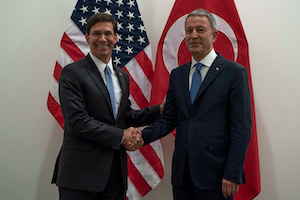Syrian Safe Zone Moves U.S.-Turkey Relationship Beyond Kobani
By Micha’el Tanchum
August 29, 2019
With Turkey poised for a cross-border invasion to clear northeastern Syria of U.S.-aligned Kurdish forces, Washington and Ankara announced an agreement on August 7, 2019 to jointly create and patrol a safe zone in the region, averting the possibility of the two NATO allies exchanging fire. Far from a climb down for Ankara, the agreement enables Turkey to achieve its minimal goals, and probably more. At the same time, it provides a significant yet delicate reset opportunity for Turkey-U.S. relations that have been severely strained since the U.S.-Kurdish military partnership than began with Battle of Kobani.

Mert: Turkey continues to play with sectarian fire
Nuray Mert in Cumhuriyet foresees that Turkey’s agreement with Russia could have some dire consequences. It is going to be difficult to explain the agreement to the Chechens and Dagestanis who used to get support in Turkey for their fight against Russia. Such people, jihadists, don’t resemble the ordinary AKP voters; they will not necessarily think that the Turkish government knows best, and passively accept its change of course. The agreement with Israel is another story. It is obvious that the reason behind it is that both countries want to counter-balance Iran in the region. Such an alliance is not promising the region peace, but only more sectarian tension, while jeopardizing the Turkish-Iranian ties. Lastly, the promise of citizenship offered by the president to the Syrian refugees in Turkey: this promises to become one of the major problems with regard to the internal political balance in Turkey as a result of the Syrian war. We all know that the issue is an instrument for the policies of Sunnification and that is going to increase the Alevi-Sunni tension in Turkey. Moreover, another dimension of the issue (of Turkish citizenship for Syrians) is related to the Kurdish-Arab balance. All of this demonstrates that the governing mentality refuses to draw any conclusions from what is happening in our country and in our region, and continues to play with (sectarian) fires.
Power over Policy: Erdoğan’s Overthrow of Davutoğlu
By Gareth H. Jenkins
May 11, 2016
Ahmet Davutoğlu has left as he came, not in response to popular demand but at President Erdoğan’s behest. Apparently unsighted by his unfailing self-belief, Davutoğlu was caught unprepared when Erdoğan made his move. The overthrow of Davutoğlu has demonstrated the naivety of the EU’s policy of appeasement. The EU officials believed that by focusing on Davutoğlu, they were strengthening him politically as a counterweight to Erdoğan. This may have been naïve, self-serving or both. It was certainly not true. But it did reinforce Erdoğan’s suspicions of Davutoğlu.
Turkey the Sentinel -- With a License for Authoritarian Rule
By Halil Karaveli
December 7th, 2015, The Turkey Analyst
The interplay of Western interests and internal Turkish dynamics has more often boosted authoritarianism than democracy in Turkey. Turkey’s strategic value as a “sentinel” during the Cold War gave Turkish governments a tacit license to suppress freedoms and democratic rights. The historical pattern is now being repeated. It is reassuring for the authoritarian Turkish regime that Turkey has once again become indispensable as a guard-post for its Western partners.
Does the EU Care about Turkey's Democracy?
By Toni Alaranta
October 28th, 2015, The Turkey Analyst
The refugee crisis is only the most recent chapter in the complex relationship between the European Union and Turkey. The common assumption in EU circles was for many years that the ruling Islamists in Turkey were Euro-democrats. Now, the EU has re-engaged with Turkey, not as a supposed beacon of “Muslim democracy” but as a gatekeeper. But by re-embracing Erdoğan’s authoritarian regime in order ensure that it keeps refugees away from Europe, Angela Merkel and her EU colleagues send the message that they care little about the fate of Turkey’s authentically European-oriented, democratic constituencies.





